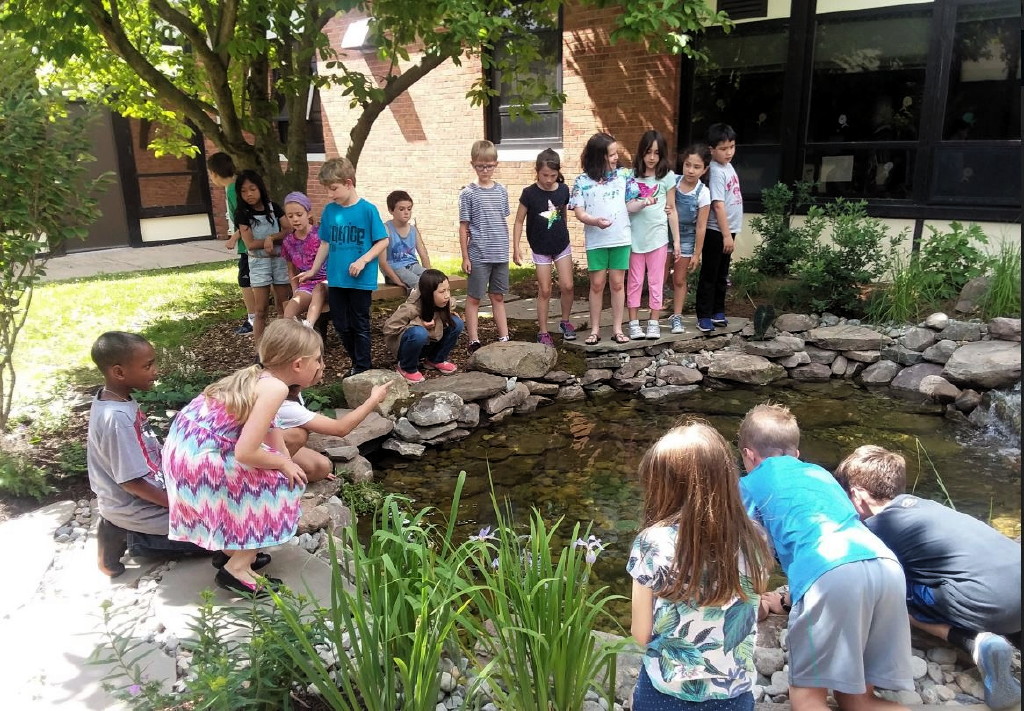When temperatures start to rise and the school year comes to a close, teachers are usually bombarded with the question, “Can we have class outside?” from their students.
With the current construction of outdoor learning spaces at Bear Tavern Elementary School, that desire will be encouraged.
Principal Christopher Turnbull stands alongside the newly built pond water feature, feeding the seven goldfish as third grade teacher Betsy Finnegan pulls weeds at the school that is located in Hopewell Township.
“Nothing short of a month ago, this was just a plot of green grass,” Finnegan said.
Bear Tavern was recently awarded a $9,200 grant from the Hopewell Valley Education Foundation (HVEF) to help pay for the construction of the pond, which lasted a total of two weekends, Turnbull said.
The pond — with goldfish provided by Allquatics in Hamilton — costed a total of $13,000, with The College of New Jersey (TCNJ) also contributing funds.
Kevin Kuchinski, HVEF President and Hopewell Valley Mayor said the outdoor learning spaces “will create a living classroom for students, enabling them to observe, touch, make connections to nature, collaborate and innovate.”
According to Finnegan, the Bear Tavern PTO held an auction to benefit the outdoor learning spaces, which generated about $10,000, allowing it to become a “long term, ongoing project.”
Construction of the outdoor learning spaces is scheduled to be completed by the end of the 2019 academic year.
The HVEF has also provided a grant of “$8426.05, [which] will allow for the purchase and installation of outdoor weather stations that will inform teaching and learning across a variety of classes at all four elementary schools [in the district],” according to a press release.
The weather stations, which have been shipped to Bear Tavern, will be three feet wide and five feet tall and give visual information about the weather to the students.
“The weather stations will allow students to develop key math and science skills such as taking measurements, making observations, detecting trends and patterns, formulating questions and collecting relevant weather data,” Kuchinski said.
Bear Tavern received $9,000 total in grant money for a meadow — which will soon be blooming with various flowers and plants — with help from Friends of Hopewell Valley Open Space (FoHVOS).
The outdoor learning spaces will soon feature two outdoor classrooms, a performing arts stage, an art center, a science center and a yoga and meditation area.
“It was very important for us from the beginning for it to be a sustainable location,” Turnbull said. “It would be able to be long term without a tremendous amount of maintenance, and it was about more than just growing plants, although that’s important. We wanted it to have multiple purposes.”
Metal troughs will be installed — one for each grade level — and will allow for various vegetables to be planted, from lettuce to pumpkins to corn, which can be washed and used in the school’s cafeteria.
What started as Turnbull, Finnegan and a “diverse” group of up to 10 staff members sitting at a table after school, scribbling layouts on a whiteboard, has evolved into a tangible plan with partnerships from Nectar’s Landscaping and Rosedale Mills.
When Turnbull came to Bear Tavern in 2015, he left behind a successful courtyard area at his former school, Ben Franklin Elementary School in Lawrenceville. Because of this, he wanted to bring something similar to the Hopewell-Titusville area.
“Why talk about something when you can experience it?” he said. “If we can find ways to make it real for the kids, that’s always going to be our goal. If you have more opportunities for exploration, they’re going to be better thinkers and notice [their] surroundings. It’s going to translate to every subject and everything that [they] do.”
According to Bear Tavern’s Curricular Connections and Next Generation Science Standards, the pond water feature specifically will allow students to “make observations, plan and carry out investigations, analyze and interpret data, construct explanations and design solutions, all stemming from connections to water.”
However, some areas of the curriculum will stretch across multiple areas of the space, Finnegan said.
To prepare for the building of the spaces, a group of teachers, including Finnegan, attended a five-session workshop at TCNJ — entitled Growing Green Thinkers — in September. It allowed them to participate in hands-on experiments such as finding the best way to filter water, which they could bring back to the classroom.
“Every workshop was three hours, and they brought in members of the community and they would talk about their experiences in their pocket of New Jersey,” Finnegan said. “It was very practical and [gave us] things we could bring back in, and gave resources in the community for field trips.”
The spaces, Turnbull said, can give the community a sense of pride, as it has allowed many organizations, parents and residents to collaborate on the project.
During the meadow planting in June, Nectar’s employees, volunteers from FoHVOS and school district parents came together to make the blueprints a reality.
“The meadow’s planning took a few weeks but the building was one day,” Turnbull said. “It was a tangible example of different groups working together.”
Turnbull and Finnegan walk through the outdoor space, which has views from classrooms, the media center and the nurse’s office inside the school.
“It provides an outlet for them to go out and have fun and get their hands dirty, even if it’s for 15 minutes,” Finnegan said. “It has such a lasting impact for the rest of the day.”

